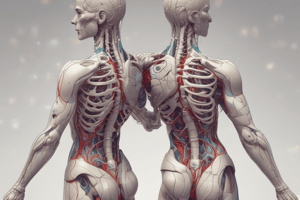Podcast
Questions and Answers
What is responsible for detecting and transmitting stimuli in living organisms?
What is responsible for detecting and transmitting stimuli in living organisms?
- Neurons (correct)
- Receptors
- Auxins
- Synapses
Which of the following is NOT an example of a receptor for detecting stimuli?
Which of the following is NOT an example of a receptor for detecting stimuli?
- Olfactory (smell)
- Auditory (hearing)
- Gustatory (taste)
- Synapses (correct)
What is the function of sensory neurons in the nervous system?
What is the function of sensory neurons in the nervous system?
- Detect stimuli and convert them into electrical impulses
- Help produce hormones for body control
- Transmit information from sense organs to the brain (correct)
- Transmit information from the brain to muscles
Which hormones are responsible for tropic movements in plants?
Which hormones are responsible for tropic movements in plants?
What is the main coordinating center of the body?
What is the main coordinating center of the body?
Which system helps produce responses to stimuli in living organisms?
Which system helps produce responses to stimuli in living organisms?
What type of actions are quick responses to dangerous stimuli using a short neural pathway?
What type of actions are quick responses to dangerous stimuli using a short neural pathway?
Which of the following is NOT a function of the brain as mentioned in the text?
Which of the following is NOT a function of the brain as mentioned in the text?
Flashcards are hidden until you start studying
Study Notes
- Living organisms respond to stimuli to protect themselves.
- Nervous and hormonal systems help produce responses.
- Neurons are responsible for detecting and transmitting stimuli.
- Receptors, part of neurons, detect stimuli and convert it into electrical impulses.
- Examples of receptors: olfactory (smell), gustatory (taste).
- Neurons carry information to different parts of the nervous system, called nerve conduction.
- Synapses are gaps between nerve endings and dendrites of other neurons.
- Sensory neurons transmit information from sense organs to the brain or spinal cord.
- Motor neurons transmit information from the brain or spinal cord to muscles or glands.
- Reflex actions are quick responses to dangerous stimuli, using a short neural pathway.
- Brain is the main coordinating center of the body, protected by meninges, cerebrospinal fluid, and cranium.
- Brain functions include thinking, decision making, storing information, reducing emotions, and controlling body functions.
- Humans have voluntary and involuntary body functions.
- Plants respond to stimuli through growth or changing cell shape.
- Phytohormones cause tropic movements in plants.
- Major phytohormones: auxins, gibberellins, cytokinins, ethylene, abscissic acid.
- Hormones in animals help control body functions, secreted by endocrine glands.
- Hormones reach target tissues or organs through the blood circulatory system.
- Adrenaline is an example of a hormone that helps produce a response to a stimulus.
- Iodized salt is important for thyroid hormone production.
- Diabetes is a disease caused by insufficient insulin production, leading to high blood sugar levels.
- Growth hormone, secreted by pituitary gland, is responsible for regular growth of body.
- Testosterone is the male sex hormone, and estrogen is the female sex hormone.
- Insulin is a hormone that controls blood sugar levels.
- Diabetes can lead to harmful effects on heart, kidneys, and eyes.
Studying That Suits You
Use AI to generate personalized quizzes and flashcards to suit your learning preferences.




